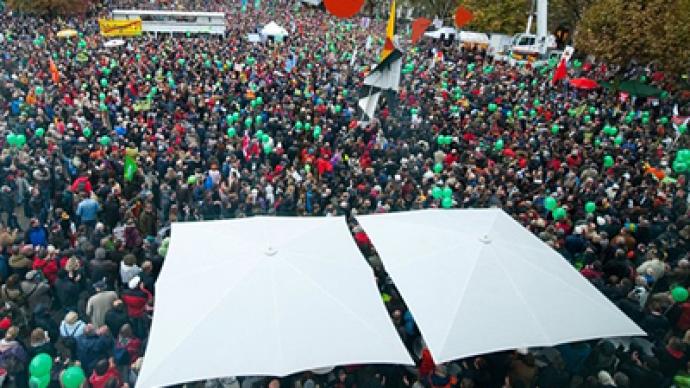Europe concludes tough year, faces more protests in 2011

As Europe wraps up a year riddled with financial trouble and massive protests, it is facing still more challenging prospects.
The summer of discontent became a winter of woe for a Europe in crisis. Across the continent, tens of thousands repeatedly turned out to protest against their governments, often resulting in violence and destruction. And as the brief holiday hiatus comes to an end, most are sure the unrest will return in the new year, possibly in its worse form yet. “Traditionally, British people are still going to celebrate Christmas, they are still going to buy their children Christmas presents. January 31-February 1st – boom – on the doormat will fall their credit card bills,” says John Gaunt from the EU Referendum Campaign. “People will begin to lose their jobs. People have been living on their credit cards to pay their mortgages, they are going to start defaulting, and that is when the real protests are going to start happening.”In the UK, it was a huge hike in college fees that sparked the violence. In Ireland, the country’s near-collapse forced its toughest-ever budget to secure an EU and IMF rescue. In Greece and Spain, public sector pay was slashed while taxes rose. For the French, it was the prospect of being forced to work more years before retirement. All these countries faced measures which ensured working people pay for the mistakes of bankers and governments.Hard-up Britons, enduring the harshest cuts since the Second World War, are also reeling over forking out around $12 billion for EU membership.“We have seen the contributions rise up,” says Fiona McEvoy from the Taxpayers Alliance. “I think it has gone up by 2.9%. Unfortunately, that is enough to get people quite red in the face because we have seen massive cuts here.” London’s biggest protest, which drew more than 50 thousand demonstrators, fell on deaf ears, as inside the House of Commons members voted to make students pay three times as much for their diplomas. Still, the protestors insist the vote has not dampened their spirits.“What Parliament can do the streets can undo,” says head of the National Union of Students, Mark Bergfeld. “We believe that we still have the chance of defeating the higher education bill, which is going to be debated in the new year.” So far in the UK, students and trade unions have been the most vocal. However, veteran politician and campaigner Tony Benn says the next move would be to form a united front through common solidarity. “Students support pensioners who are finding their pensions at some disadvantage. Public servants support those whose benefits are being cut, till the thing becomes a very powerful movement for justice,” says Benn, president of the Stop the War coalition. “And once that happens, governments have to listen.”At the moment, the cuts are on paper, but once they begin to take effect, so too will an increasingly-angry public. Not even the Christmas tree on Trafalgar Square emerged unscathed from this winter’s violence. An annual gift from the people of Norway and a symbol of peace and goodwill, protestors tried to set the tree on fire and daubed graffiti on Nelson’s Column nearby. This is unlikely to be the end of civil unrest, neither in the UK nor across Europe. As governments continue to dig their way out of the crisis by enforcing austerity on their people, the people vow to continue opposing them.












